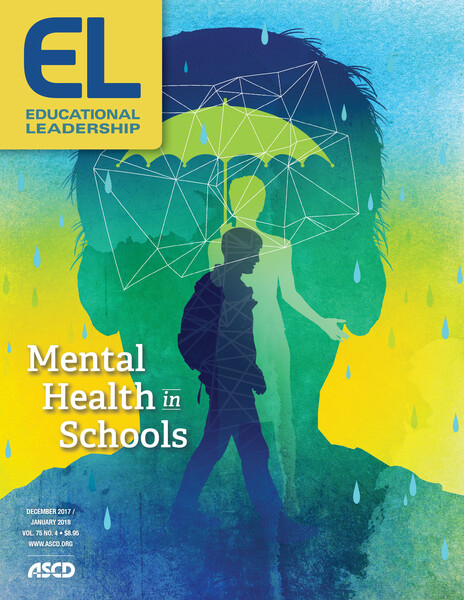Recently, students in my class participated in a discussion about depression and suicide prevention. The conversation was facilitated by two individuals from Project SUCCESS, a program designed to prevent adolescent substance use and abuse. They asked students questions about aspects of their lives that cause them stress and anxiety. The top answer: School and, more specifically, grades.
As I listened to my students identify the "pain points" in their lives, I was reminded how much pressure these 14- to 16-year-olds experience in our high-intensity, grade-focused culture. It was clear from their remarks that many of my students have little chance to rest, relax, and rejuvenate when they leave school. They spend hours each night completing homework to maintain their grades. For those balancing extracurricular activities, the challenge is even greater. It's not surprising that so many of my students come to school in the morning exhausted, coffee in hand.
It's important that teachers think about how we can adjust our approach to due dates, homework, and grading to alleviate some of the anxiety students experience at, or because of, school.
Flexible Due Dates
When I started teaching 15 years ago, I had a strict "no late work" policy. At that time, all of my students' work was done on paper, and managing all of those stacks of paper was a never-ending battle. My "no late work" policy made life easier for me, but it wasn't what was best for my students.
Now I create and share assignments via Google Classroom, which has eliminated the paper trail that made managing late work so challenging. For example, recently my students wrote an analytical paragraph on Chapter 5 of Lord of the Flies. I created the assignment in Google Classroom, which automatically created separate Google Documents with the writing prompt for every student. All of their documents for this assignment were organized in one place in our class group on Google Classroom. Instead of shuffling through a stack of paper, I was able to jump quickly in and out of documents.
The ease of managing student work with technology, especially Google Classroom, has made my life easier. In turn, I try to make my students' lives less stressful by giving them the time and space to enjoy some flexibility when it comes to completing assignments. If I am not going to look at an assignment immediately, I let them know so they can have additional time to work on it if they need to. It seems unfair to give students a firm deadline for an assignment if I am not going to get around to assessing their work for a few days after that deadline.
Valuing Revision
Part of the stress around school and grades is caused by the fact that students have little to no control over their lives at school. They rarely enjoy the freedom to make key decisions in their learning. If they fail to do an assignment or if they receive a low score, that grade is often final.
This approach places the value on the product, not the process, which seems counterproductive to me. By going digital and eliminating paper for assignments, I can invite students to revisit and revise their work over the course of a semester. I want students to know an assessment score in the gradebook is not the end of the story. That approach does not value the process of editing and improving work based on feedback. My students do not enter my 9th grade English class as phenomenal writers. They have to learn how to structure their writing, analyze texts, and follow the conventions of English. This requires practice. If the grades they receive on a piece of writing are final, where is the incentive to go back and make improvements?
Even though school is designed to teach students specific information and develop academic skills, I'd argue that the soft skills of learning to communicate with a teacher, manage time when given a flexible due date, and motivate oneself to edit and improve an assignment are crucial life skills that will serve our kids well when they go on to college or a career.
Digital Office Hours
This might be a terror-inducing thought for some teachers, but I let my students text message me with questions about an assignment. If a student needs additional time or has revised an assignment I've already assessed, they know they can send me a text message via Remind, a private messaging app for schools. I prefer these quick interactions to email, and so do my students. They are already talking to one another through texts, so they are more likely to reach out and ask for help from me if they can fire off a quick text as opposed to staying after class or even emailing me.
The Remind platform allows me to set up two-way communication with specific office hours. I prefer being available outside of normal school hours because I can then answer my students' questions as they work. The school day flies by, and questions often do not occur to students until they are at home working. For example, the night before a recent assignment was due, a student texted me, "Where do I find the video for the grade interviews? I am freaking out 'cause I have lot of stuff to do and don't know where to find the video." I immediately texted this student the YouTube link for the video about how to prepare for grade interviews. She responded immediately with "THANK YOU." She was clearly stressed out, and I was able to easily provide information to alleviate her anxiety.
Un-Stress the Stressed-Out
We want our students to be challenged, but not overwhelmed. Technology has made it easier for me to be flexible and accessible, which I hope, in turn, will help my students to feel more in confident and in control of their learning in school. I hope these solutions help to reduce a bit of unnecessary stress and anxiety for all of us.
Note to Readers
EL columnist Catlin Tucker and her family were among the many thousands of people who lost their homes during the Northern California wildfires this fall.
Many organizations have also mobilized to help victims of the wildfires:
The Red Cross is seeking donations and volunteers.
The Salvation Army is providing food, hydration, clean-up kits and more.





